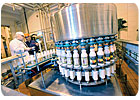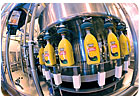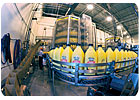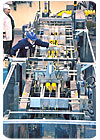

Well, maybe that’s not the best way to characterize Super Store Industries’ juice operations. Dairies have been making juices and drinks for years, sharing line time with fluid milk and other more lucrative products.
And SSI’s Sunnyside Farms Dairy in Turlock, Calif., is above all else a food plant, and what food plant these days isn’t coming up with new ways to maximize its manufacturing resources? SSI has been packaging juice in Turlock since 1994, six years after the plant was built as an ice cream and cultured facility.
At the plant about two hours west of San Francisco, up to 20 loads of orange juice arrive every week, along with daily deliveries of milk, cream and condensed. Chief among SSI’s non-dairy clients is Minute Maid, for whom the Turlock plant recently inaugurated a 59-ounce plastic bottle line for the brand’s new range of enhanced orange juice products.
Minute Maid supplies the recipes, ingredients and packaging, purchased on national contracts, for its lines packaged by SSI, explains Jeff Woodsmall, operations manager of SSI’s Turlock Dairy Division.
Fed from a descrambler upstairs, plastic bottles hit the line already labeled and take a sanitizing bath in a vertical rotary bottle washer before filling. Two large, enclosed accumulators accommodate a rush of bottles as they wait for their turn on the filler, which operates at up to 140 bottles per minute.
Filled bottles move forward into a two-lane caser that boxes them up six per case. Sealed cases head up a spiral conveyor on their way to the cooler to await shipment.
Another recent addition at Turlock is the small bottle line, which fills containers ranging from 8 to 32 ounces at a rate of 120 to 230 bottlers per minute, depending on size and type of product. Juices, drinkable yogurt and flavored milk are handled on this line, including Lala smoothies, Juice Works nectarine beverages and SSI’s own Sunnyside Farms Cowabunga single-serve milks.
Bottle caps are sanitized before they’re applied by a 10-head rotary capper; a detector weeds out bottles with low fills or ones that managed to get through without caps. Finished product is bundled on Delkor SpotPak equipment. “We put a sleeving operation on the small bottle line, which expanded our abilities,” Woodsmall says.
Among the products sharing line time at Turlock is the pomegranate beverage Pom Wonderful, a business for SSI that has grown from 4,000 cases to 10,000 per run in the past three years. Initially packaged in a glass bottle, Pom recently switched to a plastic container that mimics the look of the original unique bottle. “Pom is a challenging bottle to work with,” Woodsmall says. “Once we overcame the static – the charging effect of the plastic – it went smoothly.”
Turlock’s chilled juice operation also packages 96- and 128-ounce plastic bottles and 64-ounce gable-top cartons. Supplied bottles are moved through a depalletizer that sweeps them into rows and onto a belt on their way to the fillers. A 30-valve rotary filler handles 125 jugs per minute; a gable-top filler does 140 cartons a minute. ESL-style fillers allow for more efficient, higher-capacity product handling; strategically placed accumulation units allow the fillers to run full time.
All orange juice arrives at the plant pulp free. Pulp, calcium and other fortifications are added as needed for the various varieties. The plant also handles bulk and tote packaging of juices and drinks for its partners and co-pack clients. The plant fills juice four days a week for West Coast customers, with operations sometimes running up to six days for nationally distributed products.

Still dedicated to dairy
SSI’s Turlock plant is one of the few dairies in the San Joaquin Valley with a totally enclosed receiving bay (many California dairies sport open-air offloading areas) that can unload two trucks simultaneously.All the milk comes from Dairy Farmers of America member farms within a 90-mile radius. Once it passes quality control checks, it’s pumped into one of two 60,000-gallon raw silos. The plant also features two 20,000-gallon whey silos and a 20,000-gallon water storage tank for treated water. Used for blending juice products, water is treated at an on-site plant after being pulled from the local city well system. Treated water is pulled through several filters and a chiller before use.
The plant’s three cultured filling lines handle 6 ounce cup yogurt, 6- to 24-ounce yogurt cartons and 24- to 32-ounce yogurt and cottage cheese. Three new Delkor SpotPaks are in use for cultured cup products.
Cultured operations are being expanded with a new 40-by-40-foot fill room to handle business for a new foodservice customer. On two ice cream lines, the plant does round and square half gallons, pints and various size pails.
Finished products are stacked on pallets and shrink-wrapped, stored pending delivery in 23,000 square feet of cooler space added in 2002, when a 14,000-square-foot dry warehouse also was added for ingredient and packaging storage. Tricor software drives a computer-managed inventory tracking system that monitors shipments throughout the plant’s delivery area that extends from the Oregon border south to Bakersfield and east to Nevada.
The HTST control room will soon be upgraded with new software for its operating and batching systems. All CIP systems are fully automated and electronically archived.

Safety and security
There has been a great deal of change at Turlock in the 20 years since the plant opened. “For example, in 1988 we had two lab technicians and one manager,” Woodsmall says. “Currently we have 10 lab technicians.”And as personnel numbers have grown to accommodate growing business, so has the need to ensure safety for the work force. The company instills in its employees a strong ethic of safety, one that’s backed up with procedures on the plant floor, including such details as using a dry lube on conveyors rather than liquid or foam to avoid slip-and-fall accidents.
Further, the Turlock plant has implemented ergonomic practices into its operations in at least five ways: engineering practices; work station evaluations, modifications and training; production employees training in “spinal neutral” lifting and shoulder injury prevention; implementation of warehouse practices; and accident investigation that focuses on “at risk” behaviors and conditions.
Beyond personnel, SSI employs auditing programs and other safeguards to ensure food security, both incoming ingredients and outgoing finished products.
The company’s auditing program consists of both an in-house auditing system as well as outside audits for different customers, explains Sarah Goreham, SSI’s director of quality assurance and consumer affairs. “In-house audits are done monthly and are rotated throughout the supervisory staff of production, maintenance and distribution. These audits, along with the appropriate corrective actions, are reviewed in weekly management meetings,” Goreham says. “Each of our supervisors is responsible for certain sections of the plant that we identify by zones and all corrections that are needed in their assigned areas are expected to be managed and confirmed completed by that assigned individual. This system has proven to be very effective in managing the many aspects of good manufacturing practices, plant security and food safety.”
For outside audits, SSI’s facilities are monitored by various agencies and customers, including Silliker, Coca-Cola (parent company of Minute Maid), Quality Chekd Dairies, the California Department of Food and Agriculture, Nestlé and the U.S. Army. “The benefit to having such a demanding audit schedule throughout the year is that our facility remains in a high state of organization and cleanliness throughout the year,” Goreham says.
Suppliers are monitored through a program of physical and microbiological testing. “We require that they keep an updated GMP/food safety audits on file with our facility,” Goreham says. “We also require suppliers to send a certificate of analysis prior to shipping products, and we then monitor product quality through both finished product testing as well as isolated ingredient monitoring.”
SSI has a multilevel food safety program based on “sound principles of sanitation, ingredient testing, finished product testing and detailed tracking systems for our ingredients, packaging and finished products,” Goreham says. “Management commitment to quality is a critical aspect of our food safety program. Product distribution is monitored using lot codes in which every trailer loaded can properly identify those items and where they have been delivered.” The company also is implementing an advanced real-time system for tracking all incoming and outgoing ingredients and products utilizing a bar-code system.
SSI’s quality program consists of extensive laboratory testing and orderly documentation. Sampling of products is frequent throughout production and represents all tanks and products throughout a production day.
“The day following, all supervisory, management and other personnel are invited to participate in flavoring all products produced the prior day,” Goreham says. “We see this as a critical way to get rapid feedback from a variety of individuals. All products are then monitored throughout their shelf life at stressed temperatures to assure we are challenging the product.”
Tests – thousands performed weekly – include a variety of physical, chemical and biological profiles. The same stressed samples are then flavored seven days past code to ensure the company is utilizing a conservative and safe shelf life of the products. “Everything we make today we will sample tomorrow,” Woodsmall says. “We do that every single day.”
While pathogens are a concern in dairy product safety, yeast is the key focus for juice, Woodsmall notes. “Our CIP crew is the best,” he remarks, noting that a longer period between CIP cycles – up to 48 hours – is allowed for juice products. “Our people do a great job. Their efforts result in high-quality products.”
SSI’s QA team also feels that monitoring of the environment is a critical piece of overall quality. “Our testing includes swabbing equipment prior to production to assure proper sanitation, and we perform a great deal of air and water testing to ensure we are producing products in a suitable environment,” Goreham says. “Proper hand and foot sanitation practices and a sound training schedule are also keys to assuring food safety.”
Training topics include good manufacturing practices, good laboratory practices, HACCP, biosecurity and food safety.
SSI has a “mature” HACCP program that includes dairy, juice, cultured products, single-serve products and ice cream, Goreham explains. “Meetings are held quarterly for each line,” she says, “and personnel from management, quality assurance and maintenance are all involved in the success of these programs.”
Every procedure and safeguard goes a long way toward helping SSI take on its perpetual operational challenge: controlling cost without sacrificing quality and service. “As you can imagine,” Woodsmall says, “it’s an ongoing opportunity.”
At a Glance
Super Store IndustriesLocation: Turlock, Calif.
Year opened: 1988
Size: 148,000 square feet
Number of employees: 210
Products made: Cultured products, ice cream, chilled juices.
Total processing capacity: 8,400/6,000 gallons per hour juice, 3,600 gallons per hour per unit cultured
Pasteurization: Two tub-in-shell heat exchangers HTST for juice, two plate heat exchangers HTST for dairy.
Filling lines: Two juice, three cultured, two ice cream.
Storage capacity: 50,000 square feet cooler, 450,000 gallons liquid.
Extras
SSI’s key suppliers include the following companies:
Alcoa
Arpac
Berry Plastics
CEM
Cryovac
Delkor Systems
Denali Ingredients
Ecolab
Evergreen
Filler Specialties
Huhtamaki
Mettler-Toledo Safeline
Milkoscan
Nordson
Osgood
Sensient Flavors
SpoutPak
Videojet
Walker
Waukesha Cherry Burrell
Westfalia Separators


